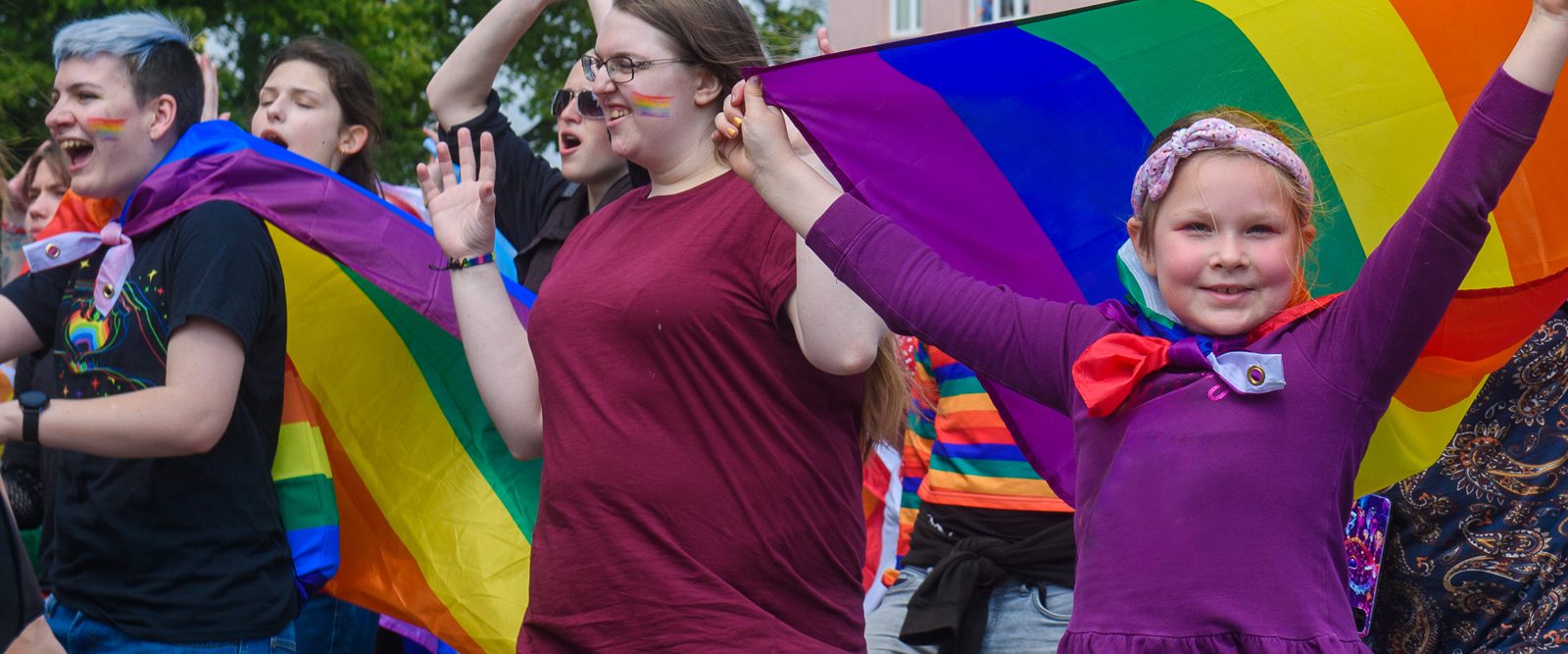What Adults and Caregivers Can Do To Support LGBTQIA+ Youth Mental Health
A psychologist shares ways to foster positive, affirming environments for children and adolescents who identify as LGBTQIA+.


Childhood and adolescence are filled with self-discovery, transformation, and increasing independence — and navigating those changes can be challenging for both children and parents. For caregivers of youth who identify as LGBTQIA+ (Lesbian, Gay, Bisexual, Transgender, Queer/Questioning, Intersex, Asexual, and other sexual and gender identities), understanding how to support a child’s growth and well-being is especially critical.
According to The Trevor Project’s 2022 National Survey on LGBTQ Youth Mental Health, 73% of LGBTQ youth reported experiencing symptoms of anxiety; 45% percent had seriously considered attempting suicide in the past year. Only 37% identified home as an LGBTQ-affirming space.
“One of the greatest indicators for good health outcomes in LGBTQIA+ youth is having affirming spaces, particularly if that place is home,” says Dr. Hugh Love Jr., a psychologist at NewYork-Presbyterian/Columbia University Irving Medical Center who specializes in LGBTQIA+ and trans-affirmative care. “Having a positive environment can help them gain a strong sense of self and know that they have someone to help navigate the difficult aspects of their life.”
The statistics show that support at home makes a remarkable difference. The same Trevor Project survey also found that LGBTQ youth who felt high social support from their family reported attempting suicide at less than half the rate of those who felt low or moderate social support.
Dr. Love, who is also an assistant clinical professor of medical psychology at Columbia University Vagelos College of Physicians and Surgeons, shares his advice on how parents of LGBTQIA+ youth can create that safe space for their child, including ways to keep communication lines open.

Dr. Hugh Love Jr.
Center conversations around their experience.
It’s normal for a parent to feel uncertain about their child’s disclosure of their sexual orientation or gender identity, Dr. Love explains, but it’s also important to respect your child and their feelings.
“There may be feelings of loss when parents find out there’s something about their child’s identity that they either know little about or they may not agree with,” says Dr. Love. “While you’re experiencing distress, keep in mind that your child is probably experiencing more. They’re exploring and coming to terms with their own identity. Making it about you and your belief system, and how you feel, or what you want, is often not the right route to take. You can either continue to form a great alliance with your child, or you can potentially push them away.”
Remember that this is their journey, and if they’re in the process of coming out, respect their disclosure.
“Don’t assume that because they want you to know, they’re ready to discuss everything with the rest of the family,” Dr. Love says. “You will want to get permission from your child to share something about them that maybe others don’t yet know.”
Educate yourself.
Enhance your knowledge on topics important to your child’s identity and investigate resources that may help in supporting them.
“There’s something about a parent getting information on their own that inherently says to a child that they care enough to go the extra step,” Dr. Love says.
“Have conversations with your child, but don’t make them the sole person who has to tell you everything about the LGBTQIA+ community.”
Be mindful of your words and actions.
“Whether or not your child identifies as LGBTQIA+, be careful about what you say and do around them, because children are sponges and they’ve been listening and watching you the entirety of their lives,” Dr. Love says.
Parents or relatives may have made past derogatory comments about LGBTQIA+ individuals, and children will take note, impacting their willingness to discuss related topics.
In a 2018 LGBTQ Youth Survey, the HRC Foundation found only 24% of youth felt they can definitely be themselves at home, and are far less likely to be out to their parents because of negative comments made about LGBTQ people.
“There is a vigilance that comes along with having a minoritized identity. You’re constantly searching for sources of threat, and you’re also looking for sources of support. So you’re hypervigilant — you’re paying very strong attention to what people around you are saying about those identities that you’ve either disclosed or not,” Dr. Love says.
“You don’t want to say you accept them but then your behaviors are contrary to this. They are paying attention to you now more than ever, because they’ve revealed something about themselves and they’re really searching and looking for your response over time.”
Find out how your child would like to be supported.
“Remember your child is an individual and there may be different things they need assistance with or that they’ll invite you to be a part of in their life,” Dr. Love says.
Supportive actions can include:
- Welcoming friends or partners who are LGBTQIA+
- Having respectful conversations about their identity
- Using the correct name and pronouns
- Supporting their gender expression
If you don’t know where to begin, ask open-ended questions, such as:
- What do you think would be important for me to know?
- What can I do to help?
“It gives them power in what can be a very powerless time and could potentially open the door to more in-depth conversations,” Dr. Love says.
Look for positive models of LGBTQIA+ representation.
Helping children find positive representations of themselves in media or everyday life can help affirm their identity and create self-esteem.
“The more positive representations they can see, the more community they can form and you can form with them to bolster their confidence and ability to navigate the world,” Dr. Love says.
Look out for signs of mental health struggles.
“When we’re not affirming or supportive, they either find that from others who may be negative influences, or they turn inward and you have a lot of these internalizing issues that could ultimately lead to suicide attempts,” Dr. Love says.
Signs that a child or teen may be struggling include:
- Withdrawal
- Significant changes in friendships
- Increased clinginess to family
- Marked changes in self-care, such as not brushing hair or washing clothes
- Self-injury
When searching for a health care professional, you can research LGBTQIA+ friendly medical and mental healthcare providers to make sure they’re the right fit for your child’s needs.
One way to support LGBTQIA+ youth and improve outcomes for their mental health and overall well-being is by providing gender-affirming care.
“Gender-affirming care indicates that it’s okay to be you,” Dr. Love says. “It should be a blanket statement across healthcare in all specialties: giving people the care that they need and validating their identity.”
Be their biggest advocate.
In addition to supporting your child at home, it’s important to be their advocate where it’s needed in other environments.
“Listen to what they’re telling you about their interactions in the outside world. Based on what they’re saying, assess whether this is a place where you want to intervene or if, instead, it’s an area for skill-building,” Dr. Love says.
“As much as we want to keep them safe, there are many situations you won’t be around for, particularly as they get older.”
You can advocate for your child with other family members by intervening in offensive or harmful conversations.
In school, having an active presence where appropriate is also helpful for fostering affirming and safe spaces, such as advocating for a gay-straight alliance or a more inclusive curriculum.
“Parents’ voices carry a lot of weight in the school system. Don’t be afraid to speak up,” Dr. Love says.
Remind them that they are loved.
“The coming out process is one that is rife with fear, because children may feel like the people who have raised them and loved them to this point are in some ways going to reject them,” Dr. Love says.
Keep the lines of communication open with your child and have your actions and words reflect your love for them.
Dr. Hugh Love Jr. is a licensed clinical psychologist at the Uptown Hub program at NewYork-Presbyterian Hospital/Columbia University Irving Medical Center, where he provides behavioral health services to young adult clients ages 14-24. Dr. Love is also the mental health lead for Compass West, a comprehensive, multidisciplinary program for transgender and gender-diverse children and adolescents. He specializes in the treatment of emerging adults and men and boys of color with specific interests in the role masculinity and gender roles play in the mental health and well-being of this population. Dr. Love has additional specialty training in psychological and neuropsychological testing.
Additional Resources
Learn more about NewYork-Presbyterian’s Compass Program and the Columbia Gender Identity Program.
Learn more about NewYork-Presbyterian’s Project STAY (Services to Assist Youth).
Find resources on supporting, educating, and advocating for LGBTQ+ people and those who love them from PFLAG.
Explore more from the Trevor Project.
Read about LGBTQIA+ advocacy from GLAAD.
See research and resources on safe, supportive, and LGBTQIA+ inclusive K-12 education from GLSEN.

